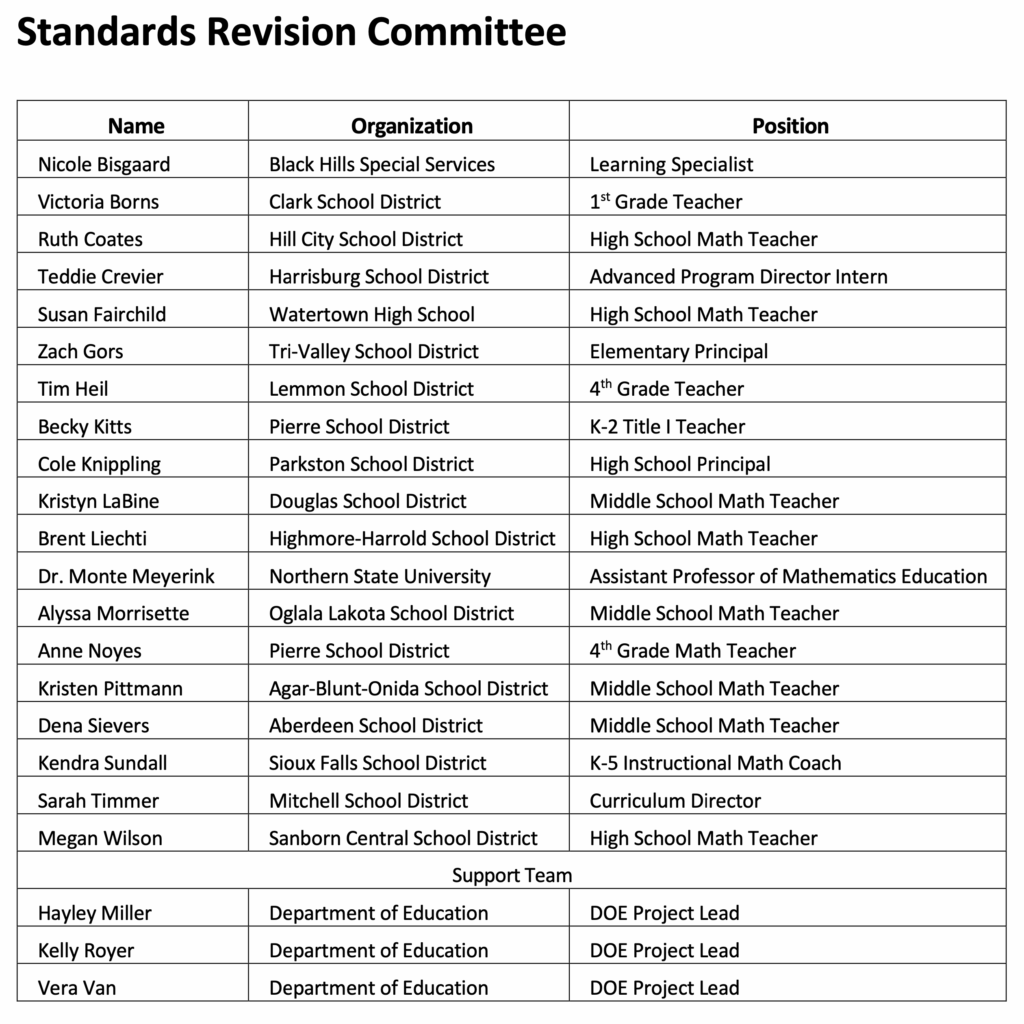The Department of Education is taking public comment on proposed revisions to the K-12 Mathematics and Health Education curriculum standards. The Board of Education Standards will hold the first public hearings on the standards at the Aberdeen Ramkota on Wednesday, October 15, at 9:00 a.m. Central and at the Sioux Falls Ramkota on Monday, November 10, at 9:00 a.m. Central. The board is also taking public comment via online survey for the health ed and math standards.
The Standards Revision Committee appears to have consisted of 18 practicing South Dakota educators and an intern:

But the Department of Education indicates that these educators didn’t write the standards themselves; they got to “review and provide feedback on the draft standards” created by the Department and guided by an unnamed Math Advisory Group:
Following the revision of the South Dakota English Language Arts standards—where one of the key priorities was alignment to the Science of Reading—the Department of Education recognized the importance of establishing a clear direction for mathematics instruction as well. Unlike ELA, mathematics lacked a similarly unified framework to guide instructional alignment. This recognition led to the decision to convene a statewide Math Advisory group to help determine the direction of math education and standards in South Dakota. This group included K–12 educators and administrators from districts across the state, as well as representatives from higher education educator preparation programs.
At its first meeting the advisory team discussed the current state of math instruction in South Dakota, identified strengths and challenges, and reviewed instructional frameworks from other states and the South Dakota Literacy Framework. The work continued at the second Math Advisory meeting where the group reviewed research findings, discussed effective instructional methodologies, and examined standards from other states and organizations, including Arkansas, North Dakota, South Carolina, and the Archimedes standards. The group provided feedback that aided the department in finalizing its key priorities for the revised standards. The revision process should produce standards that use clear and concise language, contain a balance of procedural fluency and conceptual understanding. In addition, they should align across grade spans and identify essential standards.
Using the current South Dakota Math Standards as a foundation, the department applied the advisory’s guidance and identified priorities to create a first draft of standards. In July, the Math Standards Review Committee—comprising members of the advisory group and additional math educators—convened to review and provide feedback on the draft standards. Working in grade-band teams, the committee engaged in a detailed review process, applying the Quality Standards Checklist. This checklist, originally developed during the English Language Arts standards revision, served as a tool to ensure the standards reflected the established priorities: improving clarity, removing or replacing vague language, incorporating critical content and skills, and balancing conceptual understanding with procedural fluency. It also emphasized the importance of horizontal and vertical alignment—making meaningful connections within and across grade levels [SDDOE, retrieved 2025.09.29].
Archimedes standards? What, we’re going to teach kids to run naked down the hall shouting “Eureka!” every time they pass a quiz?
Ah, yes, the math standards scheme directed by conservative Hillsdale College to expand its ideological homogenization of K-12 education and root out Common Core and the dirty and evil ideals of diversity, equity, and inclusion:
The Archimedes Standards removes the lower standards imposed by the Common Core State Standards for Mathematics (CCSSM), which provide a vague outline of content knowledge, it lack rigor, and were rushed into public use without sufficient testing and evaluation. It rejects the growing urge by ideologically extreme education theorists and administrators to subordinate mathematics instruction to politicized instruction and the discriminatory and counterproductive ideology of so-called “diversity, equity, and inclusion” (DEI). No ideologies permeate the problems ethnomathematics guides the pedagogies, and no tangential applications have been inserted that politicize. Mathematics is a discipline that is free of cultural bias, universally true, and accessible to all, which can and should provide unifying principles that Americans of all backgrounds, cultures, and political affiliations can rally behind [National Association of Scholars, “The Archimedes Standards: A Better Standard,” retrieved 2025.09.29, p. 2].
(Don’t tell Hillsdale that the Department of Education refers to its standards-creation process as “inclusive“—they’ll get cranky!)
Kristi Noem may be gone, but her pick for Education Secretary, Dr. Joseph Graves, is still apparently eager to push the top-down political agenda of Hillsdalifying all of South Dakota’s K-12 education system, including mathematics.
I rilly hoped Hiillsdale died in a shootout or just faded away.
Dominion theology proposes that [C]hristians must control the seven “mountains:” government, education, media, arts and entertainment, religion, family, and business in order to establish a global [C]hristian theocracy and prepare the world for Jesus’ return. So, the extreme white wing of the Republican Party wants a not so civil war over critical race theory and diversity, equity and inclusion or DEI because oligarchs fear an admission of guilt implies liability and they will be compelled to pay reparations to Indigenous and to the descendants of enslaved people.
Mathematical supremacy belongs to the most discriminated against group.
White High School graduates.
#grins
Never again wonder why SD is twenty-five years behind and gaining nothing.